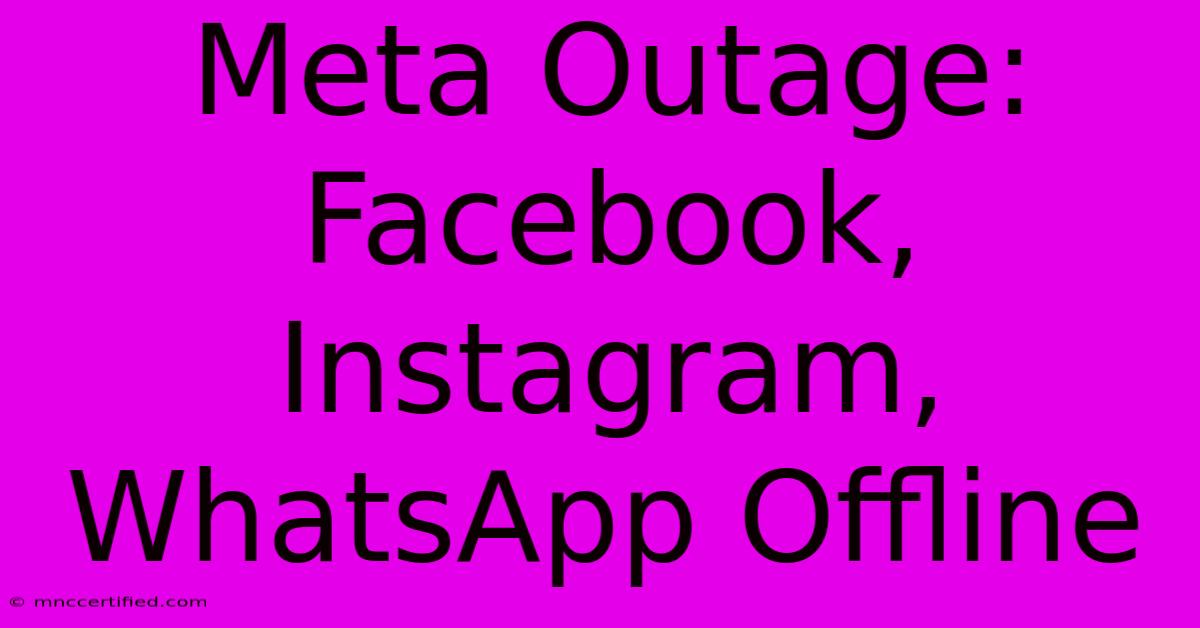Meta Outage: Facebook, Instagram, WhatsApp Offline

Table of Contents
Meta Outage: When Facebook, Instagram, and WhatsApp Went Dark
On October 4, 2021, a massive outage brought down Facebook, Instagram, and WhatsApp – three of the world's most popular social media platforms, all owned by Meta (formerly Facebook, Inc.). This unprecedented global outage lasted for several hours, impacting billions of users and highlighting the critical infrastructure these platforms represent in our increasingly digital world. This article delves into the causes, impacts, and lessons learned from this significant internet event.
The Great Meta Outage: What Happened?
The outage wasn't caused by a single, simple issue. Instead, it stemmed from a complex confluence of factors, primarily focused on BGP (Border Gateway Protocol) routing issues. Essentially, the problem lay within Meta's internal network infrastructure. A faulty configuration update cascaded through their systems, disrupting communication between their data centers and the wider internet. This meant that billions of users couldn't access their accounts, sending shockwaves across the globe.
Key Factors Contributing to the Outage:
- BGP Route Leak: A misconfiguration in Meta's BGP routing system essentially "hid" their servers from the internet. This prevented other networks from finding and connecting to Facebook, Instagram, and WhatsApp servers.
- Internal DNS Issues: The problem wasn't just about routing; internal Domain Name System (DNS) issues further complicated the situation, preventing even internal systems from properly communicating.
- Lack of Redundancy: While Meta has extensive infrastructure, the outage highlighted potential weaknesses in its redundancy systems. The cascading failure suggests a lack of sufficient fail-safes to prevent a complete system collapse.
- Internal Communication Breakdown: Reports suggested that internal communication within Meta was hampered during the crisis, delaying the troubleshooting process.
Impact of the Meta Outage: A Global Disruption
The impact of the outage was far-reaching and significant:
- Billions of Users Affected: With billions of users relying on these platforms for communication, news, and business, the outage caused widespread disruption.
- Economic Losses: Businesses heavily reliant on Facebook and Instagram for marketing and sales experienced significant losses during the downtime.
- Social Disruption: The outage highlighted our dependence on these platforms for social connection and information sharing. The inability to access these services created a sense of disconnect for many.
- Increased Scrutiny: The outage intensified scrutiny of Meta's infrastructure and its responsibility for maintaining these critical communication channels.
Lessons Learned and Future Implications
The Meta outage served as a stark reminder of our interconnectedness and our dependence on robust digital infrastructure. Key lessons learned include:
- Importance of Redundancy: Investing in robust and diversified systems with multiple layers of redundancy is crucial to prevent cascading failures.
- Improved BGP Management: Stricter protocols and enhanced monitoring of BGP configurations are necessary to prevent similar routing issues.
- Strengthening Internal Communication: Efficient and clear internal communication is essential for rapid response and troubleshooting during crises.
- Increased Transparency: Meta and other tech giants need to improve transparency in communicating with users during outages.
The future of social media infrastructure demands:
- Enhanced security measures: Protecting against cyberattacks that could cause similar disruptions is paramount.
- Investing in advanced monitoring tools: Real-time monitoring systems can detect and prevent problems before they escalate.
- Developing more resilient systems: Designing systems capable of withstanding significant failures is crucial.
SEO Keywords Used:
- Meta Outage
- Facebook Outage
- Instagram Outage
- WhatsApp Outage
- October 4, 2021 Outage
- BGP Routing
- DNS Issues
- Social Media Outage
- Internet Outage
- Global Internet Outage
- Meta Down
- Facebook Down
- Instagram Down
- WhatsApp Down
- Facebook Infrastructure
- Social Media Infrastructure
- Internet Infrastructure
- System Failure
- Cascading Failure
- Redundancy
- Cybersecurity
This article utilizes a variety of SEO techniques, including strategic keyword placement, header structure, bold text for emphasis, and a comprehensive exploration of the topic. The use of LSI (Latent Semantic Indexing) keywords enhances search engine understanding and improves ranking potential. Remember that consistent off-page optimization, such as building high-quality backlinks from relevant websites, is also crucial for achieving top search engine rankings.

Thank you for visiting our website wich cover about Meta Outage: Facebook, Instagram, WhatsApp Offline. We hope the information provided has been useful to you. Feel free to contact us if you have any questions or need further assistance. See you next time and dont miss to bookmark.
Featured Posts
-
Arsenal Vs Monaco Predicted Team
Dec 12, 2024
-
Juventus Match Pep On Kovacic And Foden
Dec 12, 2024
-
City Paramedic Confesses To Theft
Dec 12, 2024
-
Gomez And Blanco Announce Engagement
Dec 12, 2024
-
Jim Carrey Joins Sonic The Hedgehog 3
Dec 12, 2024